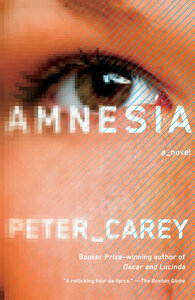You need to sign in or sign up before continuing.
Take a photo of a barcode or cover
At times this was an enjoyable, well written novel. Unfortunately those times were few and far between. It is an incredibly dissonant book by a writer who seems to believe the hype.
This is a very strange book. I will read what others say. It is well written. Every character is despicable - there is no retribution no balance. It is all very current so Peter Carey knows what is current with technology. Everyone is narcissistic. Nobody does anything of any value in society for themselves for each other. Why did Peter Carey write this? What was he out to say? to contribute?
from Judy
from Judy
Lucky to get 2 stars. Very hard going, the device of telling the story through play back of tapes was quite confusing, I had to re-read several sections as I had no idea what was going on.
This was a pretty tough slog for me. I can see the talent in the writing but the plot and characters were quite unappealing. I found that the blurb, describing a cyber attack on prison facilities in Australia and America, was misleading as the novel really didn't deal with this in any detail. The seedy suburban setting and the unsympathetic characters left a sourness that was difficult to ignore. Only just a 2 star rating for me.
‘The corporation is under our control. The angel declares you free.’
In 2010, on a chilly autumn morning in Melbourne, Gaby Baillieux releases the Angel Worm into the computers of Australia’s prison system. Many prisoners, including hundreds of asylum seekers walk free.
But, because an American corporation runs prison security, the worm also infects close to 5000 American places of incarceration. Was the American intrusion intended?
Felix Moore, who considers himself ‘Australia’s last serving left-wing journalist’ has no doubt. He’s convinced that Gaby’s act was part of a long-running covert conflict between Australia and America. What long running covert conflict? You know, the one that dates back to the Battle of Brisbane in 1942, includes the vexed issue of Pine, and the coup against Gough Whitlam in 1975.
Felix Moore himself is in a spot of bother. He’s just lost a big libel case and his wife has kicked him out. Fortunately, his good mate, property developer Woody Townes has a job for Felix. Woody is going to fund Felix to write Gaby’s biography. He’s concerned that the USA might extradite Gaby.
And then it all gets complicated. Getting Gaby (who just happens to have been born on 11 November 1975) to co-operate may be a challenge. And then, there’s her film-star mother.
Enough. It’s a complicated story that would benefit from rereading. It’s a satire that requires knowledge/memory of events that many of us have forgotten (if we ever knew them). That’s amnesia. It’s a satire about activism, journalism, politics and the relationship between Australia and the USA. It’s a satire with some fairly unlikable characters because, well, characters are less important than ideas in satire.
Just how seriously should we take it?
Not my favourite novel by Peter Carey, but definitely worth reading.
Jennifer Cameron-Smith
In 2010, on a chilly autumn morning in Melbourne, Gaby Baillieux releases the Angel Worm into the computers of Australia’s prison system. Many prisoners, including hundreds of asylum seekers walk free.
But, because an American corporation runs prison security, the worm also infects close to 5000 American places of incarceration. Was the American intrusion intended?
Felix Moore, who considers himself ‘Australia’s last serving left-wing journalist’ has no doubt. He’s convinced that Gaby’s act was part of a long-running covert conflict between Australia and America. What long running covert conflict? You know, the one that dates back to the Battle of Brisbane in 1942, includes the vexed issue of Pine, and the coup against Gough Whitlam in 1975.
Felix Moore himself is in a spot of bother. He’s just lost a big libel case and his wife has kicked him out. Fortunately, his good mate, property developer Woody Townes has a job for Felix. Woody is going to fund Felix to write Gaby’s biography. He’s concerned that the USA might extradite Gaby.
And then it all gets complicated. Getting Gaby (who just happens to have been born on 11 November 1975) to co-operate may be a challenge. And then, there’s her film-star mother.
Enough. It’s a complicated story that would benefit from rereading. It’s a satire that requires knowledge/memory of events that many of us have forgotten (if we ever knew them). That’s amnesia. It’s a satire about activism, journalism, politics and the relationship between Australia and the USA. It’s a satire with some fairly unlikable characters because, well, characters are less important than ideas in satire.
Just how seriously should we take it?
Not my favourite novel by Peter Carey, but definitely worth reading.
Jennifer Cameron-Smith
‘The corporation is under our control. The angel declares you free.’
In 2010, on a chilly autumn morning in Melbourne, Gaby Baillieux releases the Angel Worm into the computers of Australia’s prison system. Many prisoners, including hundreds of asylum seekers walk free.
But, because an American corporation runs prison security, the worm also infects close to 5000 American places of incarceration. Was the American intrusion intended?
Felix Moore, who considers himself ‘Australia’s last serving left-wing journalist’ has no doubt. He’s convinced that Gaby’s act was part of a long-running covert conflict between Australia and America. What long running covert conflict? You know, the one that dates back to the Battle of Brisbane in 1942, includes the vexed issue of Pine, and the coup against Gough Whitlam in 1975.
Felix Moore himself is in a spot of bother. He’s just lost a big libel case and his wife has kicked him out. Fortunately, his good mate, property developer Woody Townes has a job for Felix. Woody is going to fund Felix to write Gaby’s biography. He’s concerned that the USA might extradite Gaby.
And then it all gets complicated. Getting Gaby (who just happens to have been born on 11 November 1975) to co-operate may be a challenge. And then, there’s her film-star mother.
Enough. It’s a complicated story that would benefit from rereading. It’s a satire that requires knowledge/memory of events that many of us have forgotten (if we ever knew them). That’s amnesia. It’s a satire about activism, journalism, politics and the relationship between Australia and the USA. It’s a satire with some fairly unlikable characters because, well, characters are less important than ideas in satire.
Just how seriously should we take it?
Not my favourite novel by Peter Carey, but definitely worth reading.
Jennifer Cameron-Smith
In 2010, on a chilly autumn morning in Melbourne, Gaby Baillieux releases the Angel Worm into the computers of Australia’s prison system. Many prisoners, including hundreds of asylum seekers walk free.
But, because an American corporation runs prison security, the worm also infects close to 5000 American places of incarceration. Was the American intrusion intended?
Felix Moore, who considers himself ‘Australia’s last serving left-wing journalist’ has no doubt. He’s convinced that Gaby’s act was part of a long-running covert conflict between Australia and America. What long running covert conflict? You know, the one that dates back to the Battle of Brisbane in 1942, includes the vexed issue of Pine, and the coup against Gough Whitlam in 1975.
Felix Moore himself is in a spot of bother. He’s just lost a big libel case and his wife has kicked him out. Fortunately, his good mate, property developer Woody Townes has a job for Felix. Woody is going to fund Felix to write Gaby’s biography. He’s concerned that the USA might extradite Gaby.
And then it all gets complicated. Getting Gaby (who just happens to have been born on 11 November 1975) to co-operate may be a challenge. And then, there’s her film-star mother.
Enough. It’s a complicated story that would benefit from rereading. It’s a satire that requires knowledge/memory of events that many of us have forgotten (if we ever knew them). That’s amnesia. It’s a satire about activism, journalism, politics and the relationship between Australia and the USA. It’s a satire with some fairly unlikable characters because, well, characters are less important than ideas in satire.
Just how seriously should we take it?
Not my favourite novel by Peter Carey, but definitely worth reading.
Jennifer Cameron-Smith
There isn't anything about this book I liked! The story was disjointed with no flow and the characters unlikeable.
Thank you to Goodreads First Reads for providing me with a free copy of Amnesia.
Peter Carey is always a hit and miss author for me. I love his vivid, muscular prose and the way he brings a setting to life but sometimes have trouble engaging with his characters and plots. This proved true for Amnesia as well. While Felix, the beaten down journalist and Gaby,the cyberpunk activist, were intermittently interesting, the plot was noir-ishly murky and ultimately not as interesting as the blurb seemed to promise.
Peter Carey is always a hit and miss author for me. I love his vivid, muscular prose and the way he brings a setting to life but sometimes have trouble engaging with his characters and plots. This proved true for Amnesia as well. While Felix, the beaten down journalist and Gaby,the cyberpunk activist, were intermittently interesting, the plot was noir-ishly murky and ultimately not as interesting as the blurb seemed to promise.
Well written with realistically drawn characters, especially the main guy, but most of them are at least moderately unpleasant people. Cool to see some old computer stuff (Zork & BBS) that I know about, also I learned some Australian history. Much more a character study than a genre book, which was not really what I was expecting from the blurb (but goes along with the author's previous work).






